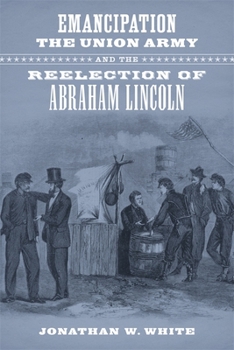Emancipation, the Union Army, and the Reelection of Abraham Lincoln
Select Format
Select Condition 
Book Overview
The Union army's overwhelming vote for Abraham Lincoln in the 1864 presidential election has led many Civil War scholars to conclude that the soldiers supported the Republican Party and its effort to abolish slavery. In Emancipation, the Union Army, and the Reelection of Abraham Lincoln, Jonathan W. White challenges this reigning paradigm in Civil War historiography, arguing that the army vote is not a reliable index of ideological motivation or political sentiment. Although 78 percent of soldiers cast ballots for Lincoln, White contends that this was not due wholly to a political or social conversion to the Republican Party. Rather, he cites previously ignored mitigating factors such as voter turnout, intimidation at the polls, and soldiers' choices in other elections that same year.
While recognizing that many in the military changed their views on slavery and emancipation during the war, White suggests that a considerable number of soldiers who voted for Lincoln still rejected the Republican platform or disagreed with his views on slavery. For them, like many northerners, a vote for the Democratic ticket was considered to be treasonous and an admission of defeat. Using previously untapped court-martial records from the National Archives, as well as manuscript collections from across the country, White convincingly revises many commonly held assumptions about the Civil War era and provides a deeper understanding of the Union army.
Related Subjects
History




